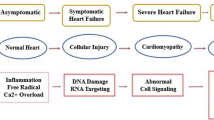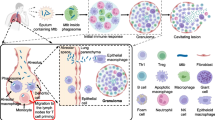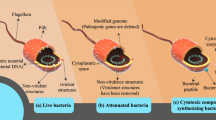Summary
The anti-cancer efficacy of methionine γ-lyase (MGL) from Clostridium sporogenes (C. sporogenes) is described. MGL was active against cancer models in vitro and in vivo. The calculated EC50 values for MGL were 4.4 U/ml for A549, 7.5 U/ml for SK-BR3, 2.4 U/ml for SKOV3, and 0.4 U/ml for MCF7 cells. The combination of doxorubicin (DOX) and MGL was more effective for A549 human lung cancer growth inhibition than either agent alone in vitro and in vivo. MGL reduced the EC50 of doxorubicin from 35.9 μg/mL to 0.01–0.265 μg/mL. The growth inhibitory effect of DOX + MGL on A549 xenografts in vivo was reflective of the results obtained in vitro. The inhibition rate of tumor growth in the combined arm was 57%, significantly higher than that in the doxorubicin (p = 0.033)-alone arm.




Similar content being viewed by others
References
El-Sayed AS (2010) Microbial L-methioninase: production, molecular characterization, and therapeutic applications. Appl Microbiol Biotechnol 86(2):445–467
Cellarier E, Durando X, Vasson MP et al (2003) Methionine dependency and cancer treatment. Cancer Treat Rev 29:488–489
Hoffman RM (2015) Development of recombinant methioninase to target the general cancer-specific metabolic defect of methionine dependence: a 40-year odyssey. Expert Opin Biol Ther 15:21–31
Kreis W, Hession C (1973) Biological effects of enzymatic deprivation of L-methionine in cell culture and an experimental tumor. Cancer Res 33:1866–1869
Yoshioka T, Wada T, Uchida N, Maki H, Yoshida H, Ide N, Kasai H, Hojo K, Shono K, Maekawa R, Yagi S, Hoffman RM, Sugita K (1998) Anticancer efficacy in vivo and in vitro, synergy with 5-fluorouracil and safety of recombinant methioninase. Cancer Res 58:2583–2587
Tan Y, Sun X, Xu M, Tan X, Sasson A, Rashidi B, Han Q, Tan X, Wang X, An Z, Sun FX, Hoffman RM (1999) Efficacy of recombinant methioninase in combination with cisplatin on human colon tumors in nude mice. Clin Cancer Res 5:2157–2163
Kokkinakis DM, Wick JB, Zhou Q-X (2002) Metabolic response of normal and malignant tissue to acute and chronic methionine stress in athymic mice bearing human glial tumor xenografts. Chem Res Toxicol 15:1472–1479
Murakami T, Li S, Han Q, Tan Y, Kiyuna T, Igarashi K, Kawaguchi K, Hwang HK, Miyake K, Singh AS, Nelson SD, Dry SM, Li Y, Hiroshima Y, Lwin TM, DeLong J, Chishima T, Tanaka K, Bouvet M, Endo I, Eilber FC, Hoffman RM (2017) Recombinant methioninase effectively targets a Ewing’s sarcoma in a patient-derived orthotopic xenograft (PDOX) nude-mouse model. Oncotarget 8:35630–35638
Kawaguchi K, Igarashi K, Li S, Han Q, Tan Y, Kiyuna T, Miyake K, Murakami T, Chmielowski B, Nelson SD, Russell TA, Dry SM, Li Y, Unno M, Eilber FC, Hoffman RM (2017) Combination treatment with recombinant methioninase enables temozolomide to arrest a BRAF V600E melanoma growth in a patient-derived orthotopic xenograft. Oncotarget 8:85516–85525
Igarashi K, Kawaguchi K, Li S, Han Q, Tan Y, Murakami T, Kiyuna T, Miyake K, Miyake M, Singh AS, Eckardt MA, Nelson SD, Russell TA, Dry SM, Li Y, Yamamoto N, Hayashi K, Kimura H, Miwa S, Tsuchiya H, Singh SR, Eilber FC, Hoffman RM (2018) Recombinant methioninase in combination with DOX overcomes first-line DOX resistance in a patient-derived orthotopic xenograft nude-mouse model of undifferentiated spindle-cell sarcoma. Cancer Lett 417:168–173
El-Sayed AS, Shouman SA, Nassrat HM (2012) Pharmacokinetics, immunogenicity and anticancer efficiency of aspergillus flavipes L-methioninase. Enzym Microb Technol 51(4):200–210
Stern PH, Hoffman RM (1986) Enhanced in vitro selective toxicity of chemotherapeutic agents for human cancer cells based on a metabolic defect. J Natl Cancer Inst (Bethesda) 76:629–639
Kokkinakis DM, Schold SCJ, Hori H, Nobori T (1997) Effect of long-term depletion of plasma methionine on the growth and survival of human brain tumor xenografts in athymic mice. Nutr Cancer 29:195–204
Kokkinakis DM, Hoffman RM, Frenkel EP, Wick JB, Han Q, Xu M, Tan Y, Schold SC (2001) Synergy between methionine stress and chemotherapy in the treatment of brain tumor xenografts in athymic mice. Cancer Res 61:4017–4023
Morozova EA, Kulikova VV, Yashin DV, Anufrieva NV, Anisimova NY, Revtovich SV, Kotlov MI, Belyi YF, Pokrovsky VS, Demidkina TV (2013) Kinetic parameters and cytotoxic activity of recombinant methionine γ-Lyase from Clostridium tetani, Clostridium sporogenes, Porphyromonas gingivalis and Citrobacter freundii. Acta Nat 5(3):92–98
Studier FW (2005) Protein production by auto-induction in high-density shaking cultures. Protein Expr Purif 41:207–234
Anufrieva NV, Morozova EA, Kulikova VV, Bazhulina NP, Manukhov IV, Degtev DI, Gnuchikh EY, Rodionov AN, Zavilgelsky GB, Demidkina TV (2015) Sulfoxides, analogues of L-methionine and L-cysteine as pro-drugs against gram-positive and gram-negative Bacteria. Acta Nat 7(4):128–135
Pokrovskaya MV, Pokrovskiy VS, Aleksandrova SS, Anisimova NY, Andrianov RM, Treschalina EM, Ponomarev GV, Sokolov NN (2012) Recombinant intracellular Rhodospirillum rubrum L-asparaginase with low L-glutaminase activity and antiproliferative effect. Biochemistry (Moscow) Supplement Series B: Biomedical Chemistry 6(2):123–131
Chou T-C (2010) Drug combination studies and their synergy quantification using the Chou-Talalay method. Cancer Res 70:440–446
Wang WT, Zhao Y, Gao JL et al (2014) Cytotoxicity enhancement in MDA-MB-231 cells by the combination treatment of tetrahydropalmatine and berberine derived from Corydalis yanhusuo. Intercult Ethnopharmacol 3(2):68–72
Sidoruk KV, Pokrovsky VS, Borisova AA, Omeljanuk NM, Aleksandrova SS, Pokrovskaya MV, Gladilina JA, Bogush VG, Sokolov NN (2011) Creation of a producent, optimization of expression, and purification of recombinant Yersinia pseudotuberculosis L-asparaginase. Bull Exp Biol Med 152(2):219–223
Pokrovskaya MV, Aleksandrova SS, Pokrovsky VS, Veselovsky AV, Grishin DV, Abakumova OY, Podobed OV, Mishin AA, Zhdanov DD, Sokolov NN (2015) Identification of functional regions in the Rhodospirillum rubrum L-asparaginase by site-directed mutagenesis. Mol Biotechnol 57(3):251–264
Pokrovsky VS, Kazanov MD, Dyakov IN, Pokrovskaya MV, Aleksandrova SS (2016) Comparative immunogenicity and structural analysis of epitopes of different bacterial L-asparaginases. BMC Cancer 16:89
Sannikova EP, Bulushova NV, Cheperegin SE, Gubaydullin II, Chestukhina GG, Ryabichenko VV, Zalunin IA, Kotlova EK, Konstantinova GE, Kubasova TS, Shtil AA, Pokrovsky VS, Yarotsky SV, Efremov BD, Kozlov DG (2016) The modified heparin-binding L-Asparaginase of Wolinella succinogenes. Mol Biotechnol 58(8–9):528–539
Pokrovsky VS, Treshalina HM, Lukasheva EV, Sedakova LA, Medentzev AG, Arinbasarova AY, Berezov TT (2013) Enzymatic properties and anticancer activity of L-lysine α-oxidase from Trichoderma cf. aureoviride Rifai BKMF-4268D. Anti-Cancer Drugs 24(8):846–851
Babich OO, Pokrovsky VS, Anisimova NY, Sokolov NN, Prosekov AY (2013) Recombinant l-phenylalanine ammonia lyase from Rhodosporidium toruloides as a potential anticancer agent. Biotechnol Appl Biochem 60(3):316–322
Mecham JO, Rowitch D, Wallace CD, Stern PH, Hoffman RM (1983) The metabolic defect of methionine dependence occurs frequently in human tumor cell lines. Biochem Biophys Res Commun 117:429–434
Hoffman RM, Erbe RW (1976) High in vivo rates of methionine biosynthesis in transformed human and malignant rat cells auxotrophic for methionine. Proc Natl Acad Sci U S A 73:1523–1527
Hoffman RM (1984) Altered methionine metabolism, DNA methylation, and oncogene expression in carcinogenesis: a review and synthesis. Biochim Biophys Acta 738:49–87
Guo H, Herrera H, Groce A, Hoffman RM (1993) Expression of the biochemical defect of methionine dependence in fresh patient tumors in primary histoculture. Cancer Res 53:2479–2483
Morozova EA, Anufrieva NV, Davydov DZ, Komarova MV, Dyakov IN, Rodionov AN, Demidkina TV, Pokrovsky VS (2017) Plasma methionine depletion and pharmacokinetic properties in mice of methionine γ-lyase from Citrobacter freundii, Clostridium tetani and Clostridium sporogenes. Biomed Pharmacother 88:978–984
Acknowledgements
The authors thank Prof. Robert Hoffman (AntiCancer Inc., San Diego, USA) and Prof. Tatiana Demidkina (Engelhardt Institute of Molecular Biology, Moscow, Russia) for valuable comments and suggestions.
Funding
The publication has been prepared with the support of the “RUDN University program 5-100”, and research grant MD-1780.2017.7 from the presidential grant committee.
Author information
Authors and Affiliations
Corresponding author
Ethics declarations
Conflict of interest
Authors declare that they have no conflict of interest.
Ethical approval
All applicable international, national, and/or institutional guidelines for the care and use of animals were followed.
Rights and permissions
About this article
Cite this article
Pokrovsky, V.S., Yu Anisimova, N., Zh Davydov, D. et al. Methionine gamma lyase from Clostridium sporogenes increases the anticancer effect of doxorubicin in A549 cells and human cancer xenografts. Invest New Drugs 37, 201–209 (2019). https://doi.org/10.1007/s10637-018-0619-4
Received:
Accepted:
Published:
Issue Date:
DOI: https://doi.org/10.1007/s10637-018-0619-4




